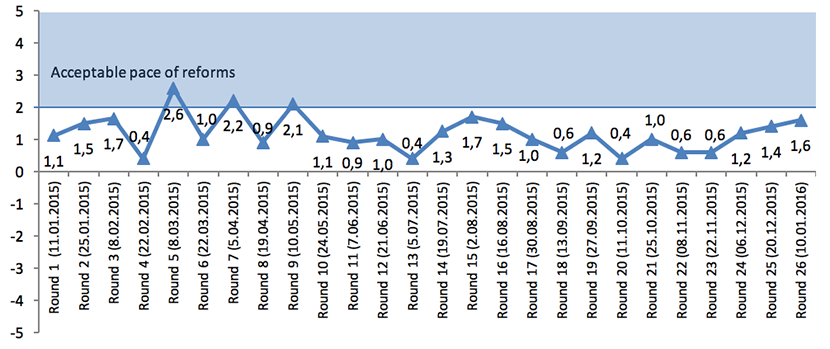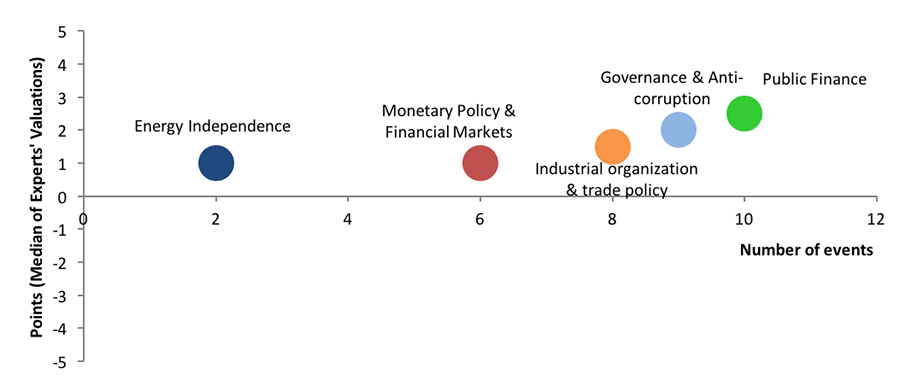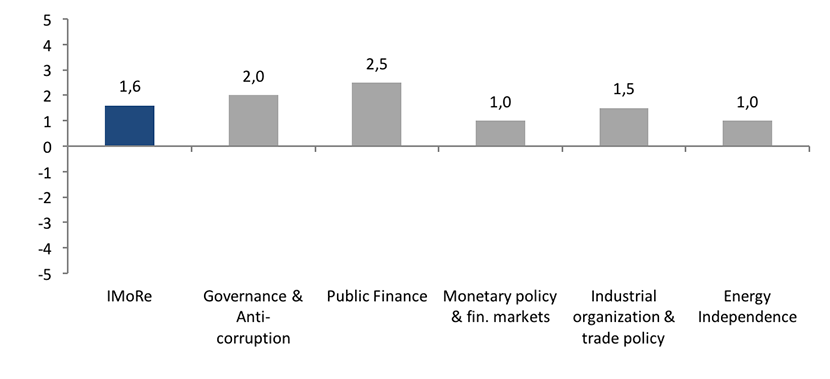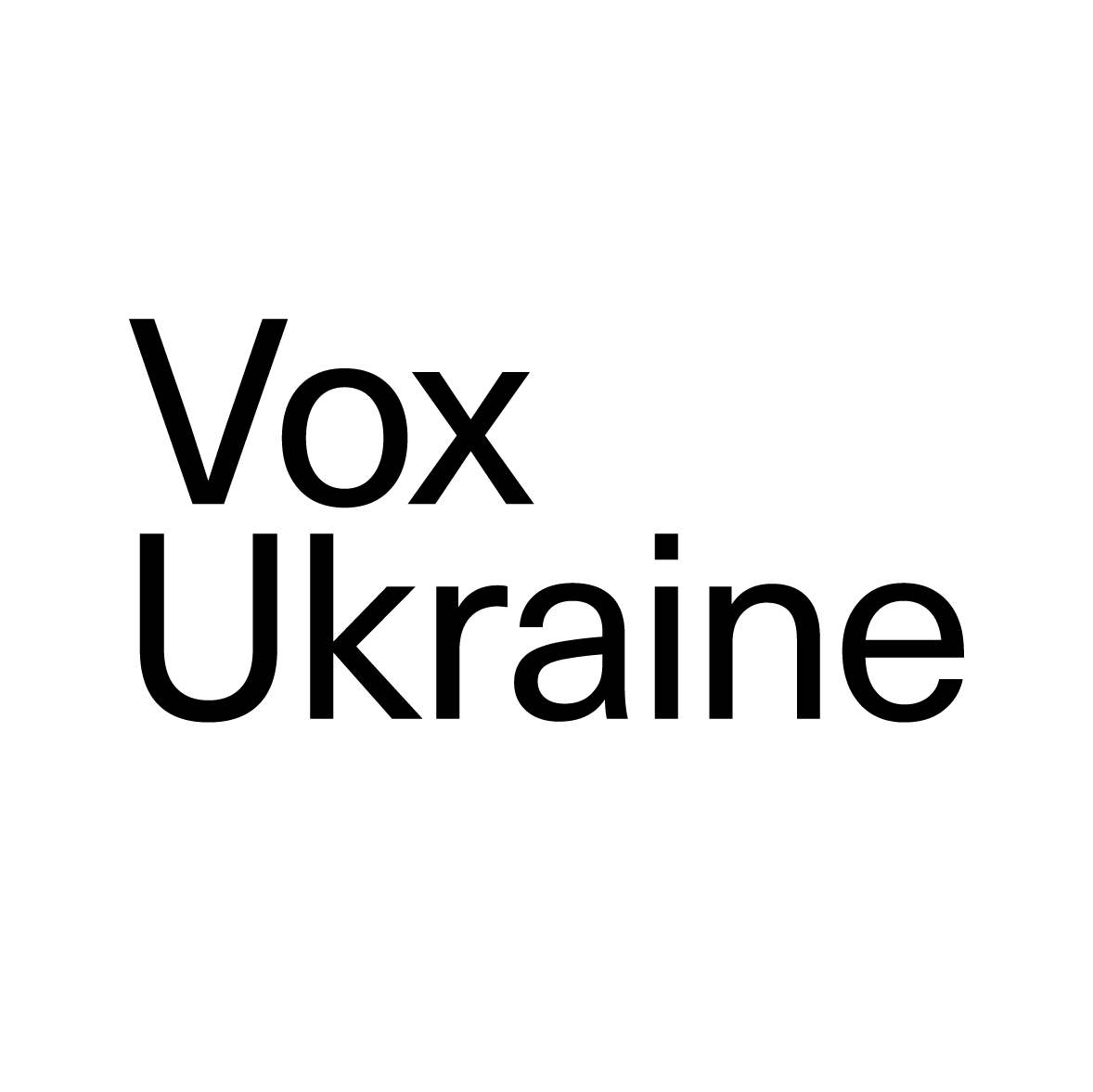Reform Index aims to provide a comprehensive assessment of reform efforts by Ukraine’s authorities. The Index is based on expert assessments of changes in the regulatory environment in five areas. Reform Index value for the 26th monitoring period (December 21, 2015 – January 10, 2015) stood at +1.6 points out of the possible range from -5.0 to +5.0 points.
The adoption of the budget and other laws from the budget package, civil service reform, optimization of administrative services, some deregulation measures and on-going reform of “Naftogaz Ukraine” all were the major contributors to the Index growth.
Chart 1. Reform Index dynamics

Chart 2. Reform Index and its components in the current round
First of all, there are the laws from budget package, which fueled Public Finance sector progress to +2.5 points. The law on State Budget for 2016 (928-VIII of 25.12.2015) received +3.0 points, of which +2.0 points in the Public Finance sector and +1.0 point in the sector of Monetary Policy and Financial Markets. Experts also stressed that the law transfers funding and responsibilities to local budgets and it is a prerequisite for restoring the IMF financing. With regard to the independence of the National Bank, the law still contains provisions for the lower limit of NBU profit to be transferred to the state budget, but its size was reduced. Among the negative points, experts noted the process of the law’s adoption and delay in the enactment of a new system of electronic declaration of civil servants incomes.
Other laws from the budget package were positively evaluated as well. Amendments to the Tax Code as a whole (law 909-VIII of 24.12.2015) scored +2.0 points. The greatest achievements are unified social fee cut and gradual transition of agrarians to a common system of VAT. There was a slight expansion of the tax base in order to compensate for the reduced rates of unified social fee. The law on the stabilization of the state’s financial conditions and improvement of certain provisions of the social policy (law 911-VIII of 24.12.2015) received +2.0 points as well. Changes launch optimization of social security policies, implement verification, while some of the privileges were replaced by targeted aid. On the other hand, experts emphasize the need for a comprehensive reform of social protection. +2.0 points were given to the changes to the Budget Code, which reduce the options for budget amendments (law 914-VIII of 24.12.2015) during the year, which will contribute to a more consistent and predictable fiscal policy.
Governance and Anti-Corruption sector received +2.0 points. In particular +2.8 points experts gave to the new law on civil service (law 889-VIII of 10.12.2015), noting a significant progress. According to Timothy Mylovanov from the University of Pittsburgh, the law
more or less clearly spelled out the structure of orders and instructions, and their implementation, as well as the possibilities for civil servants to challenge them and demand them in a written form.
The law that expands the powers of local authorities in providing administrative services (law 888-VIII of 10.12.2015) and the law on access of the media to meetings parliament’s committees (law 873-VIII of 09.12.2015) received +2.0 points each.
The CMU decree 892 of 04.11.2015 on the reorganization of territorial structure of the State Fiscal Service, which aims to reduce the number of regional tax offices, garnered +3.0 points in total (+1.5 points in each Governance and Public Finance), reflecting the high necessity of the State Fiscal Service reform; on the other hand, reorganization may only be a superficial step.
Industrial Organization and Trade Policy scored +1.5 points, where the highest grades experts assigned to the law on deregulation in agriculture (law 867-VIII of 08.12.2015) and the law on adaptation of seed certification system and procedures for registration of plant varieties to EU requirements (law 864-VIII of 08.12.2015), which is a small but important step in the implementation of free trade area with the EU.
Monetary Policy and Financial Markets, as well as Energy Independence received +1.0 point. The CMU decree 1002 from 05.12.2015 on certain issues of improving corporate governance of NJSC “Naftogaz Ukraine” received a total of +4.0 points (as the sum in Energy Independence and Industrial Organization and Trade Policy). Olena Pavlenko from analytical center “DiXi Group” says:
Approval of the documents on corporate governance reform of NJSC “Naftogaz”- is certainly a positive step. The company, which was constantly losing money and pulled out resources from the state budget, now has a chance to become more transparent in its activities, have a clear structure and decision-making. This will increase the confidence of foreign partners and investors, “Naftogaz” will have a greater chance to raise funds for its activities and development. At the same time, the reform of corporate governance of “Naftogaz” should be harmonized with the broader reform of the gas market and strategic decision of the government about the role of “Naftogaz” in the market. For example, whether gas extracting companies should stay as a part of “Naftogaz”, or they should be beyond its control. Such decisions cannot be taken at the company level; they should be the result of public debate and a clear decision of the CMU.
Reform Index aims to provide a comprehensive assessment of reform efforts by Ukraine’s authorities. The Index is based on expert assessments of changes in the regulatory environment in five areas:
- Governance and Anti-Corruption
- Public Finance and Labor Market
- Monetary Policy and Financial Markets
- Industrial Organization and Foreign Trade
- Energy Independence
For details please visit reforms.voxukraine.org
Chart 3. Value of Reform Index components and number of events December 21, 2015 – January 10, 2016

Main media partner Project partners

Attention
The authors do not work for, consult to, own shares in or receive funding from any company or organization that would benefit from this article, and have no relevant affiliations




